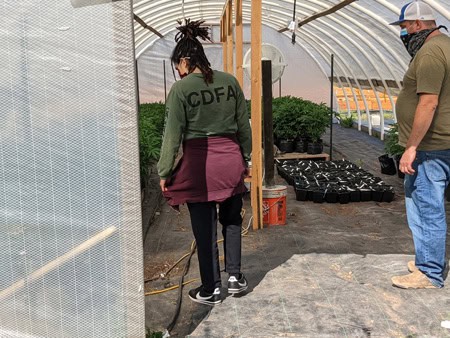 By: Attorney Lauren Vázquez
By: Attorney Lauren Vázquez
High Rise Law, Founder & Principal
For all the bad that came with the COVID pandemic, the cannabis industry has endured relatively well. There was a collective sigh of relief when California declared cannabis businesses to be essential early in lock down, something unimaginable just a few years ago.
With the exception of the targeted robberies and looting last summer and the advent of social distancing precautions, it was mostly business as usual for the cannabis industry.
One welcomed change for cannabis business owners was the pause on state and local compliance inspections. With the shelter-in-place, government closures, and social distancing mandates, inspections have been noticeably absent.
The CA Department of Public Health went so far as to institute self-inspections for manufacturers and some places like the City of Los Angeles set up virtual inspections.
Cannabis Inspections Happening
However, now that the state is cautiously opening up we are already seeing an uptick in inspections and the news is not good. Earlier this year a colleague shared a story of a BCC raid that was reminiscent of the terrorizing police raids under Prop 215 and SB 420. Agents came in, property was seized, and the business shuttered. Interestingly, during a client’s recent CDFA farm inspection in Mendocino County the inspectors were from Los Angeles and Sacramento as part of a larger touring group of inspectors being cross-trained on cannabis farms.
That week there were no less than a dozen sets of inspectors conducting at least two inspections per day throughout Northern California. It should be noted that at that time they were using outdated versions of the CDFA inspection forms. Through a California Public Records Request High Rise Law obtained the most recent version and it is 30 pages longer making the original look like child’s play. You can view a copy of it here along with the updated cultivation penalty matrix here.
The Department of Cannabis Control consolidation isn’t going to slow things down either. Initially scheduled for July 2020, the consolidation went into effect July 2021 giving the Bureau of Cannabis Control and other state agencies an extra year to get a handle on the transition. At this year’s Cal NORML Legal Seminar Acting BCC Chief Tamara Colson reported that all of the current staff at the agencies would remain on board at the new DCC in pretty much the same positions even staying in their current offices.
They have set up one DCC coordinated enforcement unit that has been given top priority. Depending on the type of action, the unit will engage other government agencies including law enforcement. While management has been working on consolidation, all the state inspectors have had to do for the last year is practice and train for the coming reckoning.
If that weren’t enough, don’t forget about local inspections. They are often more detailed and cover more areas of regulation than the state agencies including things like disabled parking, signage, and security measures. Some local governments have contracted out their inspections to private companies which adds even more variables to the whole process.
So what’s the big deal? Are inspections really that serious? Yes, they are the primary method of licensing enforcement. The risks are huge and prior notice is not required. It is a violation in and of itself to not be prepared for an inspection. Some of the penalties are mind blowing. The failure to provide or maintain proper records on the premises alone can result in a $30,000 fine per violation. Due to the complicated nature of cannabis compliance, most inspections result in a Notice of Noncompliance.
Generally the licensee is given a time frame to correct the violations and avoid the fines. Some major violations and subsequent offenses however are not treated lightly. Fines are not the only thing to worry about though. The state and local agencies are also authorized to issue administrative holds, confiscate products, and even force licensees to destroy inventory. Worst case scenario they can suspend and revoke the cannabis license which would spell the end for any business who can’t afford to fight it.
How to Handle an Inspection
If you’ve already experienced an inspection, beware. The inspectors are not your friend. Repeat violations will get you in trouble. If they think a business is unsafe, they will take action. If you haven’t had an inspection yet, get ready – you are next. Fortunately, there are a few easy things you can do to prepare. Once you receive an inspection notice:
- Prepare your staff to greet and escort the inspector
- Have the visitor log ready
- Make sure all the required licenses, permits, and signs are posted and current
- Clean up. Clear all floors and walkways
- Wrap up any pending METRC inputs
- Prepare your sales records
- Make sure the person meeting with the inspector has access to all required business records
While these steps won’t address all potential violations, some are red flags to inspectors that will cause them to look a little closer at everything else. By addressing these you will start the inspection with a good impression and motivate the inspector to work with, not against you. The inspections are coming, but instead of brushing things under the rug take this as an opportunity to test and improve your business and be the best you can be.
——-
Compliance is complicated but High Rise Law is here to help. Our one-of-a kind Cannabis Inspection Protection℠ Services will ensure your business performs at its best when it matters most.



